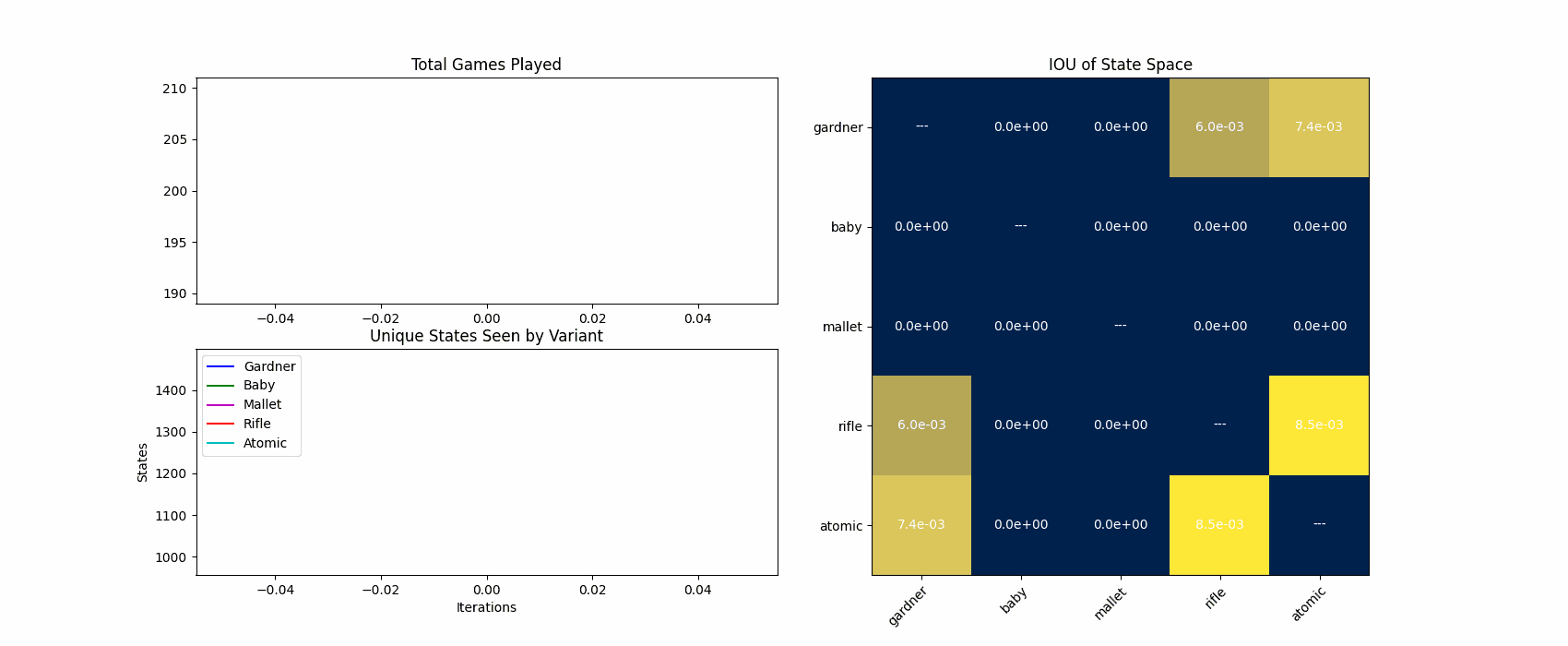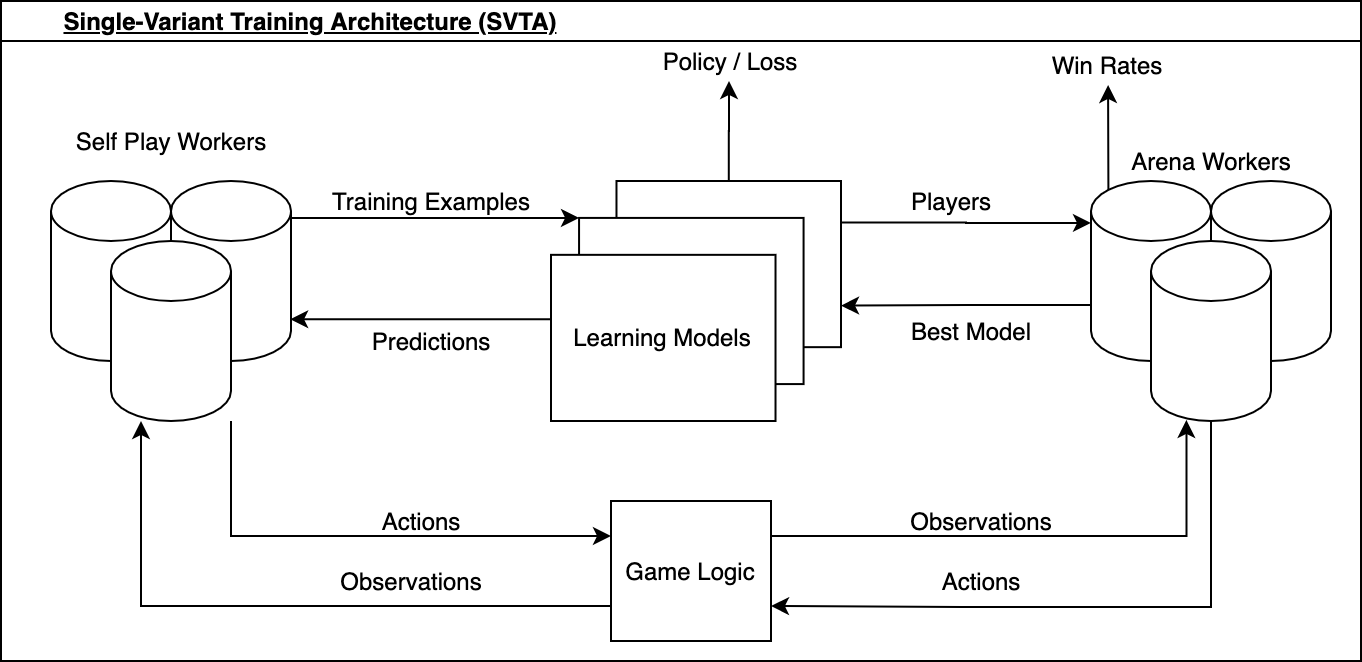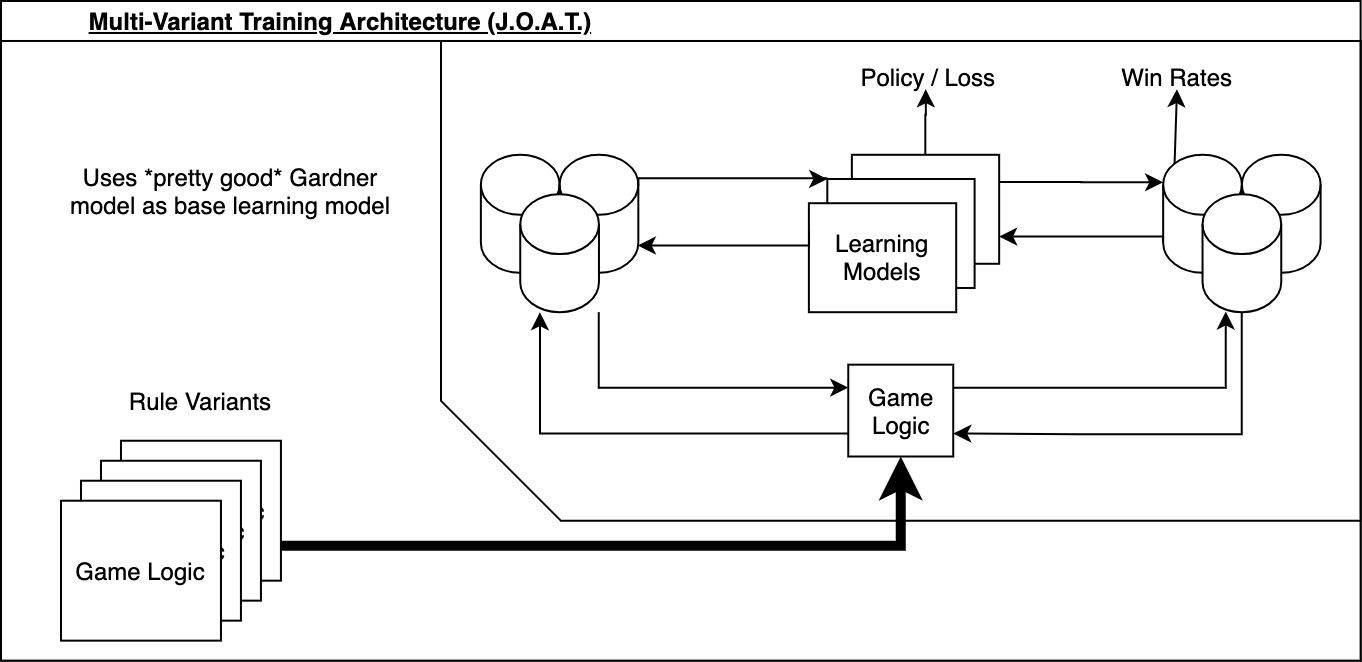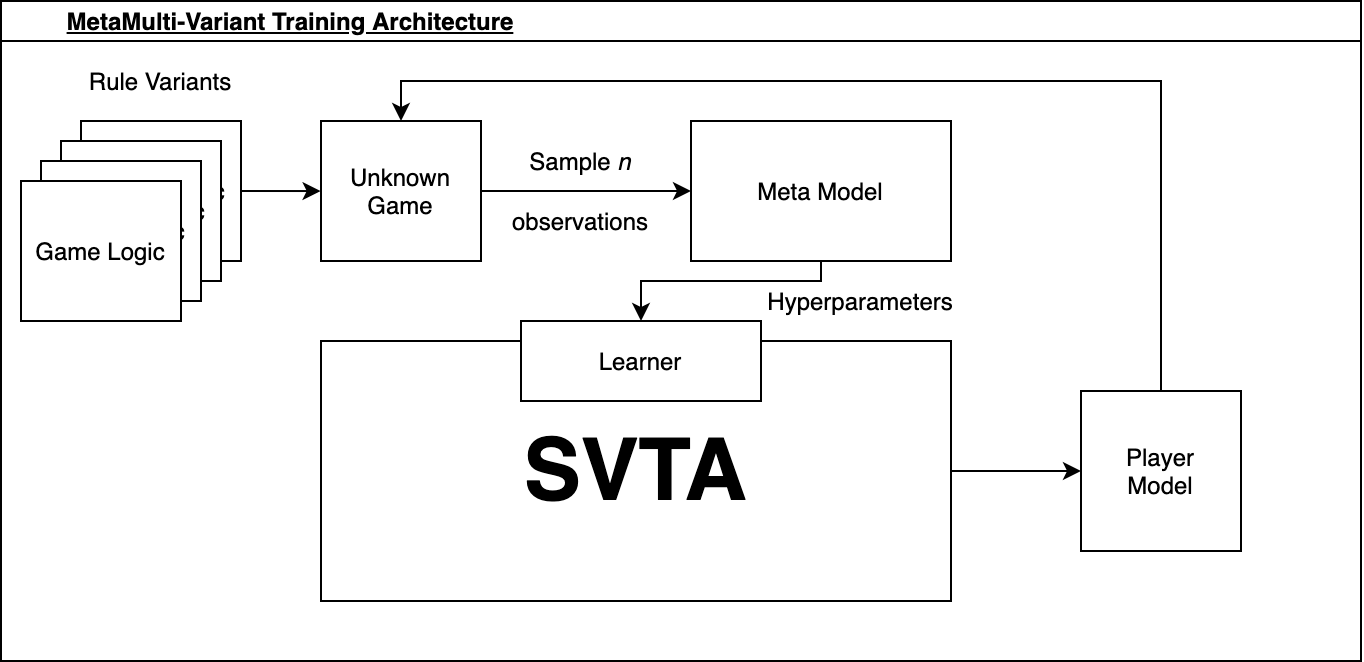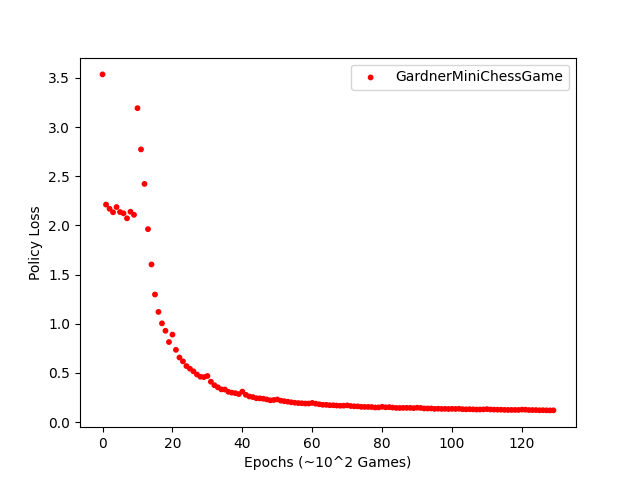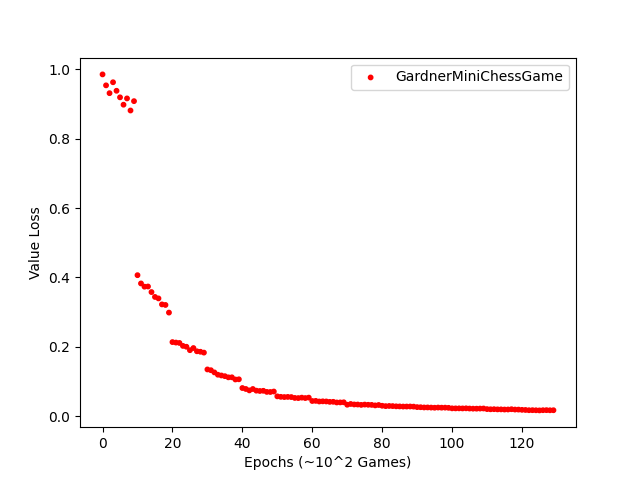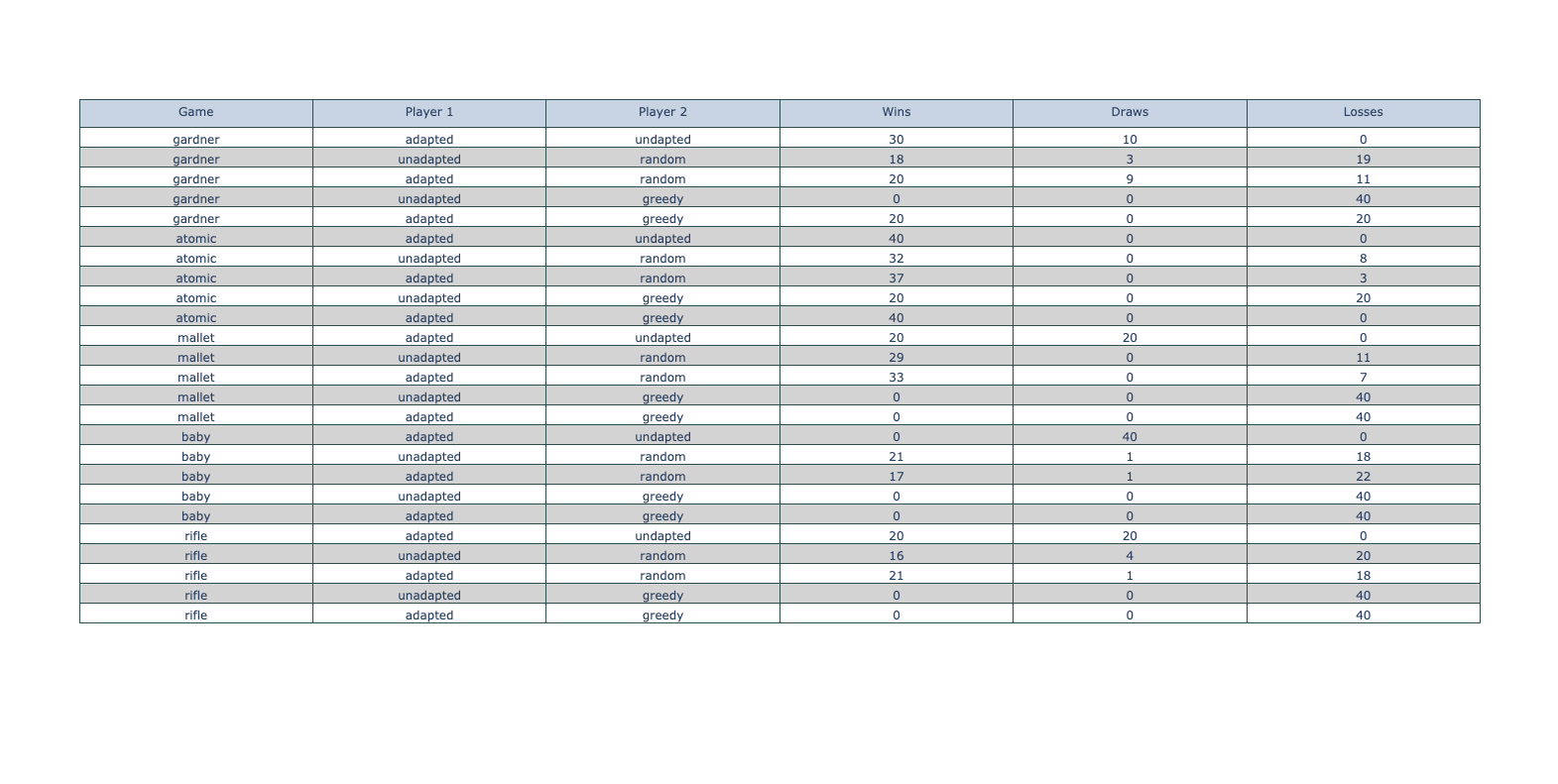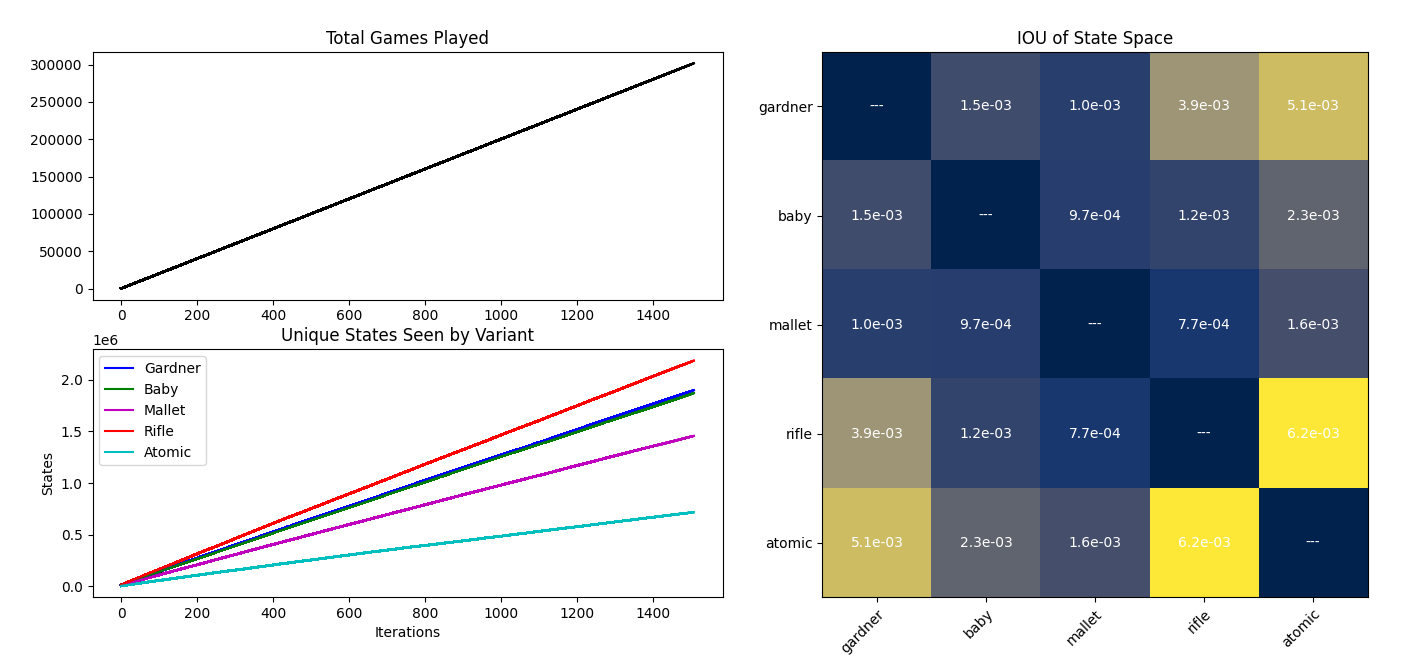An environment to run meta-learning experiments on minichess games with varying rulesets. Class project for MIT's 6.883: Meta Learning.
See also: minichess and gym-minichess.
- Contents
- Quickstart
- Scripts
- Objective
- Methodology
- Environment
- Results
- Result Log
- Changelog
- References
- Appendix
Clone the repository:
git clone https://github.com/mdhiebert/meta-minichess.git
cd meta-minichessCreate conda environment:
conda env create -f environment.yml
conda activate mmcNOTE: all scripts have been tested far more extensively with distributed than undistributed processes. mileage may vary if --workers is left at default. undistributed is a WIP.
Launch experiment to train a jack-of-all-trades minichess model with distributed computing:
python -m scripts.train --workers=6 --games gardner mallet baby rifle dark atomic --eval_on_baselines --arenapergame=0To use more workers, simply bump up the --workers value.
See progress in terminal and updated loss plots in ./policy_loss.png and ./value_loss.png.
To conduct testing on the JOAT model's ability to adapt to a specific game variant:
python -m scripts.meta_test --loading_path pretrained_models/pytorch/meta15.pth.tar --workers=6 --eval_on_baselines --games gardner atomic mallet baby dark rifleSpin up a VM instance via Google Cloud Compute Engine
- May run into specifications and limits based upon numbers of vCPUs wanted and region/zone of hosting
Download Google Cloud SDK Locally
gcloud compute scp --recurse meta-minichess/ instance-name:~First, SSH into the VM
gcloud compute ssh instance-nameOnce in, install basic tools, download the latest Anaconda distribution, execute the shell script, and then reset the bash commands.
sudo apt-get update
sudo apt-get install bzip2 libxml2-dev
sudo apt-get install wget
wget https://repo.anaconda.com/archive/Anaconda3-2020.11-Linux-x86_64.sh
bash Anaconda3-2020.11-Linux-x86_64.sh
rm Anaconda3-2020.11-Linux-x86_64.sh
source .bashrc
Now, it's ready to follow Quickstart Guide above!
For more details on training, refer to the help:
$ python -m scripts.train --help
usage: train.py [-h] [--iterations ITERATIONS] [--episodes EPISODES]
[--mcts_sims MCTS_SIMS] [--arenapergame ARENAPERGAME]
[--max_moves MAX_MOVES] [--win_threshold WIN_THRESHOLD]
[--workers WORKERS]
[--games {gardner,mallet,baby,rifle,dark,atomic} [{gardner,mallet,baby,rifle,dark,atomic} ...]]
[--probs PROBS [PROBS ...]] [--eval_on_baselines] [--debug]
Train a multitasking minichess model.
optional arguments:
-h, --help show this help message and exit
--iterations ITERATIONS
Number of full AlphaZero iterations to run for
training (default: 500)
--episodes EPISODES Number of episodes of self-play per iteration
(default: 100)
--mcts_sims MCTS_SIMS
Number of MCTS simulations to perform per action.
--arenapergame ARENAPERGAME
The number of Arena Games to conduct per game variant
per iteration. This number will be divided in half to
give the model equal reps as both black and white. If
this is 0, Arena will be skipped. (default: 10)
--max_moves MAX_MOVES
The maximum number of moves permitted in a minichess
game before declaring a draw (default: 75)
--win_threshold WIN_THRESHOLD
The win threshold above which a new model must reach
during arena-play to become the new best model
(default: 0.6)
--workers WORKERS The number of workers to use to process self- and
arena-play. A value >1 will leverage multiprocessing.
(default: 1)
--games {gardner,mallet,baby,rifle,dark,atomic} [{gardner,mallet,baby,rifle,dark,atomic} ...]
The games to consider during training. (default: just
gardner)
--probs PROBS [PROBS ...]
The probabilities of the games to consider during
training. The ith probability corresponds to the ith
game provided. If no value is provided, this defaults
to a uniform distribution across the provided games.
(default: uniform dist)
--eval_on_baselines If passed in, we will evaluate our model against
random and greedy players and plot the win rates.
--debug
For more details on testing, refer to the help:
$ python -m scripts.meta_test --help
usage: meta_test.py [-h] [--loading_path LOADING_PATH] [--episodes EPISODES]
[--mcts_sims MCTS_SIMS] [--arenapergame ARENAPERGAME]
[--max_moves MAX_MOVES] [--workers WORKERS]
[--games {gardner,mallet,baby,rifle,dark,atomic} [{gardner,mallet,baby,rifle,dark,atomic} ...]]
[--learning_rate LEARNING_RATE] [--dropout DROPOUT]
[--epochs EPOCHS] [--batch_size BATCH_SIZE]
[--num_channels NUM_CHANNELS] [--eval_on_baselines]
[--use_cuda] [--dont_use_cuda] [--skip_self_play]
[--debug]
Test a JOAT minichess model via n-shot adaptation.
optional arguments:
-h, --help show this help message and exit
--loading_path LOADING_PATH
Path to the JOAT model weights.
--episodes EPISODES Number of episodes of self-play for adaptation og JOAT
(default: 100)
--mcts_sims MCTS_SIMS
Number of MCTS simulations to perform per action.
--arenapergame ARENAPERGAME
The number of Arena Games to conduct per game variant.
This number will be divided in half to give the model
equal reps as both black and white. If this is 0,
Arena will be skipped. (default: 10)
--max_moves MAX_MOVES
The maximum number of moves permitted in a minichess
game before declaring a draw (default: 75)
--workers WORKERS The number of workers to use to process self- and
arena-play. A value >1 will leverage multiprocessing.
(default: 1)
--games {gardner,mallet,baby,rifle,dark,atomic} [{gardner,mallet,baby,rifle,dark,atomic} ...]
The games to consider during testing. The adapted JOAT
model will be assessed for each variant. (default:
just gardner)
--learning_rate LEARNING_RATE
The learning rate during adaptation.
--dropout DROPOUT Dropout rate during adaptation.
--epochs EPOCHS Number of epochs during adaptation.
--batch_size BATCH_SIZE
Batch size during adaptation.
--num_channels NUM_CHANNELS
Number of channels to use in the model during
adaptation.
--eval_on_baselines If passed in, we will evaluate our model against
random and greedy players and plot the win rates.
--use_cuda If passed, force the system to use CUDA. (default:
whether or not CUDA is available)
--dont_use_cuda Force the system NOT to use CUDA, even if its
available (default: False)
--skip_self_play Skip self-play to to load in training examples; if
true, must be .examples path in same directory as
loading_path per game in --games (default: False)
--debug
Exploration experiment to see search spaces of the MCTS for each game variant.
$ python -m scripts.explore_statesWrites a JSON file in the following format:
{
"str_board_hash": [
bool_for_gardner,
bool_for_baby,
bool_for_mallet,
bool_for_rifle,
bool_for_atomic
],
...
}Run this script to automatically launch a state-exploration experiment
In practical application, one of the most compelling aspects of human intelligence is its adaptability. With strategy games, like chess (or its smaller variant, minichess), the value of this aspect shines most brightly in situations where rules are not static from game to game. In chess, these dynamic conditions manifest themselves as variants of standard play. In real life, they may manifest themselves as changing weather or terrain conditions, or other unforeseen and sudden human/machine limitations.
State of the art reinforcement learning models are able to achieve superhuman performance under static conditions. AlphaZero, and its successor, MuZero, have attained practically-perfect levels of skill in games like Chess, Shogi, and Go. This performance quickly deteriorates when the rules they were trained under are altered. An AlphaZero model exhibiting perfect play in Gardner minichess, say, loses TODO% of its games against a random player in variants of the game like Atomic chess.
To this end, we seek to create a meta-learning framework around a modified implementation of AlphaZero in order to train a meta-model which can identify changing conditions and provide a learning model which can quickly (≤1 AlphaZero iteration) adapt to and excel under them.
Much of the initial effort was spent creating an environment to facilitate our minichess meta/reinforcement learning experiments. There were no pre-existing libraries that supported the rule variants of minichess, so we created our own.
We set out to implement several different variants of standard Gardner minichess:
- Baby Chess - a variant with the same rules, but a different starting configuration.
- Mallet Chess - another variant with the same rules, but a different starting configuration.
- Rifle Chess - standard starting configuration, but captures happen "at range", where the capturing piece does not occupy the tile of the captured piece
- Atomic Chess - standard starting configuration, but captures also remove the capturing piece and all non-pawn pieces surrounding the captured piece
- Monochromatic Chess - standard starting configuration, but pieces can only move to tiles that share the color of the tile they started on
- Bichromatic Chess - standard starting configuration, but pieces can only move to tiles that have the opposite color of their current tile
- Dark Chess - standard starting configuration, but a player can only see their own pieces and tiles that their pieces can move to, the rest remain "dark"
- Extinction Chess - standard starting configuration but the victory conditions are changed, the first player to remove all of any one kind of piece from their opponent (e.g. capturing the king, or both rooks, all pawns) wins.
The first repository, minichess, was created to handle the game logic of our base ruleset, Gardner's Minichess, and several others. We implemented Gardner, Baby, Mallet, Dark, Rifle, Atomic, Monochromatic, and Bichromatic.
Wrappers for these are implemented in ./games. The wrapper for gardner, baby, and mallet were borrowed (with slight modification) from Karthik Selva's fork of alpha-zero-general.
We also created an OpenAI gym environment for minichess, found at gym-minichess.
Work on this was halted as we pivoted towards experiments not relying on the gym substructure.
For our RL model, we have chosen to represent our action space as a (1225,) vector. This is because we have:
- 5 x 5 = 25 possible tiles to choose from when selecting a piece
- 8 directions to move it in, maximum magnitude 4 to move from initial position along that direction
- additional 8 possible knight moves
- 3 underpromotions (knight, bishop, rook), with 3 moves to result in an underpromotion (left-diag capture, forward, right-diag capture).
This gives us 5x5x(8x4 + 8 + 3x3) = 1225 possible actions to choose from.
Of course. Not all moves are valid at every step. To account for this, we simply apply a mask over illegal moves to our networks output and re-normalize.
The first step was to train an expert-level Gardner minichess model to serve as the base of future adaptable models. The intuition was that since it had mastered the standard ruleset, its understanding of the innate mechanisms of minichess would enable it to learn other rulesets more quickly than from scratch.
As such, we relied on the alpha-zero-general implementation of AlphaZero mentioned above to serve as our inner loop for AlphaZero iterations. However, at the time of this project, the repository did not support distributed computation, resulting in extremely slow training. To remedy this, we modified the pipeline to allow for multiprocessing. This modified system can be found in learning/alpha_zero/distributed.
We thus had the following training architecture for learning on single variants:
Our inner loop architecture is composed of four major parts: self-play, game logic, arena-play, and the learning model.
The game logic handles all non-player components of our setup. It has inherent knowledge of the legality of moves and values of game states. It accepts input from external inputs (such as a human player or a learning model) in the form of actions, which it translates to updated game state. These properties are not actively involved in the training process, per se, but are pulled at every state to inform and correct moves throughout.
The learning model is a neural network comprised of four sequential convolutional blocks followed by four fully connected layers. All convolutional layers have size 3, stride 1. The first two layers have extra padding of 1. We BatchNormalize after each convolutional layer. They all have depth 512.
The linear layers each have hidden size 1024 and dropout rate of 0.3. The third hidden layer maps our hidden vector to a vector with the size of the action space and applies log-softmax activation. This represents a distribution across all possible actions to take and is renormalized post-mask.
The fourth linear layer maps the hidden vector to a value, with tanh activation. This represents the relative value of a state from [-1, 1].
An MCTS operates alongside the learning model. At every game state, we create a new tree with the current game state as the root node. We then randomly walk through our tree of possible future game states until we arrive at a state that our MCTS model has not seen before. We select this to be our leaf node and extend one layer of depth beyond it. From this extended node, we simulate a game to completion. Based on the result of this simulation, we backpropagate through our path according to the upper confidence bound formula from AlphaZero. Over time, we explore more and more of the game space and develop a much more robust understanding of what is and is not a good move. We chose to allow the model 200 MCTS simulations for each move.
In self play, our model plays itself to generate training examples, using MCTS to determine which action is most conducive to success. The model then trains on these examples to improve its own policy. In the arena, we pit these models against one another to determine which is most effective at achieving desirable outcomes. The end result is a model which is most "skillful" in the environment provided.
Our meta-training architecture for multiple variants is very similar to MAML for RL, and was inspired by a project done for MIT's 6.882 in Spring of 2019: INSECT. The double gradient loop of MAML requires many self-play iterations, which prove to be the most costly portion of the training loop. By removing the second gradient loop and instead taking an average over the policies found in the inner loop, we cut down on a significant amount of training time. In exposing our model to our distribution of tasks by sampling a rule-variant and running it through our SVTA, we aim to produce a Jack-of-All-Trades (JOAT) model that can quickly adapt to different variants.
In pseudocode:
policy = random_init_policy()
while not done:
tasks = sample(task_distribution)
policies_prime = []
for task in tasks:
loss = 0
for _ in range(K):
loss += mcts_iteration(policy)
policy_prime = policy - (alpha * gradient(loss))
policies_prime.append(policy_prime)
policy = average(policies_prime)
return policyThis implementation can be found at JOATCoach.metatrain() in learning/alpha_zero/distributed/joat_coach.py
The results of our metatraining can be seen in results.
In addition, we also tried to tackle this problem from a different angle, using controlled dropout to improve performance across varying rulesets:
TODO
♜ ♞ ♝ ♛ ♚
♟ ♟ ♟ ♟ ♟
⊙ ⊙ ⊙ ⊙ ⊙
♙ ♙ ♙ ♙ ♙
♖ ♘ ♗ ♕ ♔
♜ ♞ ♝ ♛ ♚
♟ ♟ ♟ ♟ ♟
⊙ ⊙ ⊙ ⊙ ♙
♙ ♙ ♙ ♙ ⊙
♖ ♘ ♗ ♕ ♔
♜ ♞ ♝ ♛ ♚
♟ ♟ ⊙ ♟ ♟
⊙ ⊙ ♟ ⊙ ♙
♙ ♙ ♙ ♙ ⊙
♖ ♘ ♗ ♕ ♔
♜ ♞ ♝ ♛ ♚
♟ ♟ ⊙ ♟ ♟
⊙ ⊙ ♟ ⊙ ♙
♙ ♙ ♙ ♙ ♕
♖ ♘ ♗ ⊙ ♔
♜ ♞ ♝ ⊙ ♚
♟ ♟ ⊙ ♟ ♟
⊙ ⊙ ♟ ⊙ ♙
⊙ ♙ ♙ ♙ ♕
⊙ ⊙ ♗ ⊙ ♔
♜ ♞ ⊙ ⊙ ⊙
♟ ♟ ⊙ ⊙ ♟
⊙ ⊙ ♟ ⊙ ⊙
⊙ ♙ ♙ ♙ ♕
⊙ ⊙ ♗ ⊙ ♔
WHITE WIN
This move sequence stumps models in the early stages of training.
♜ ♞ ♝ ♛ ♚
♟ ♟ ♟ ♟ ♟
⊙ ⊙ ⊙ ⊙ ⊙
♙ ♙ ♙ ♙ ♙
♖ ♘ ♗ ♕ ♔
♜ ♞ ♝ ♛ ♚
♟ ♟ ♟ ♟ ♟
⊙ ♙ ⊙ ⊙ ⊙
♙ ⊙ ♙ ♙ ♙
♖ ♘ ♗ ♕ ♔
♜ ♞ ♝ ♛ ♚
♟ ♟ ♟ ♟ ⊙
⊙ ♙ ⊙ ⊙ ♟
♙ ⊙ ♙ ♙ ♙
♖ ♘ ♗ ♕ ♔
♜ ♞ ♝ ♛ ♚
♟ ♟ ♙ ♟ ⊙
⊙ ⊙ ⊙ ⊙ ♟
♙ ⊙ ♙ ♙ ♙
♖ ♘ ♗ ♕ ♔
♜ ♞ ♝ ♛ ♚
♟ ♟ ♙ ♟ ⊙
⊙ ⊙ ⊙ ⊙ ⊙
♙ ⊙ ♙ ♟ ♙
♖ ♘ ♗ ♕ ♔
♜ ♞ ♝ ♙ ♚
♟ ♟ ⊙ ♟ ⊙
⊙ ⊙ ⊙ ⊙ ⊙
♙ ⊙ ♙ ♟ ♙
♖ ♘ ♗ ♕ ♔
♜ ♞ ♝ ♙ ♚
♟ ♟ ⊙ ♟ ⊙
⊙ ⊙ ⊙ ⊙ ⊙
♙ ⊙ ♙ ⊙ ♙
♖ ♘ ♗ ♕ ♟
BLACK WIN
At iteration ~15 it is replaced with the following sequence:
♜ ♞ ♝ ♛ ♚
♟ ♟ ♟ ♟ ♟
⊙ ⊙ ⊙ ⊙ ⊙
♙ ♙ ♙ ♙ ♙
♖ ♘ ♗ ♕ ♔
♜ ♞ ♝ ♛ ♚
♟ ♟ ♟ ♟ ♟
⊙ ⊙ ⊙ ♙ ⊙
♙ ♙ ♙ ⊙ ♙
♖ ♘ ♗ ♕ ♔
♜ ♞ ♝ ♛ ♚
♟ ♟ ♟ ♟ ⊙
⊙ ⊙ ⊙ ♟ ⊙
♙ ♙ ♙ ⊙ ♙
♖ ♘ ♗ ♕ ♔
♜ ♞ ♝ ♛ ♚
♟ ♟ ♟ ♟ ⊙
⊙ ⊙ ⊙ ♙ ⊙
♙ ♙ ♙ ⊙ ⊙
♖ ♘ ♗ ♕ ♔
♜ ♞ ♝ ♛ ♚
♟ ♟ ⊙ ♟ ⊙
⊙ ⊙ ⊙ ♟ ⊙
♙ ♙ ♙ ⊙ ⊙
♖ ♘ ♗ ♕ ♔
♜ ♞ ♝ ♛ ♚
♟ ♟ ⊙ ♟ ⊙
⊙ ⊙ ⊙ ♙ ⊙
♙ ♙ ⊙ ⊙ ⊙
♖ ♘ ♗ ♕ ♔
♜ ♞ ♝ ⊙ ♚
♟ ♟ ⊙ ♟ ⊙
⊙ ⊙ ⊙ ♙ ⊙
♛ ♙ ⊙ ⊙ ⊙
♖ ♘ ♗ ♕ ♔
♜ ♞ ♝ ⊙ ♚
♟ ♟ ⊙ ♟ ⊙
⊙ ⊙ ⊙ ♙ ⊙
♛ ♙ ⊙ ⊙ ♕
♖ ♘ ♗ ⊙ ♔
♜ ♞ ♝ ⊙ ♚
♟ ♟ ⊙ ♟ ⊙
⊙ ⊙ ⊙ ♙ ⊙
⊙ ♙ ⊙ ⊙ ♕
♛ ♘ ♗ ⊙ ♔
♜ ♞ ♝ ⊙ ♕
♟ ♟ ⊙ ♟ ⊙
⊙ ⊙ ⊙ ♙ ⊙
⊙ ♙ ⊙ ⊙ ⊙
♛ ♘ ♗ ⊙ ♔
WHITE WIN
[11/26] Trained Gardner model and subsequent meta model. Took ~30 hours all-in-all. Gardner iterations take substantially more time only because of hyperparameters (20 episodes / meta-task vs 100 episodes / gardner-task). We will likely bump this up if results are not satisfactory.
[11/25] Bug fixes and more training. Created diagrams and added significant information to the README.
Implemented new JOAT training loop based on MAML/INSECT.
[11/24] Added scripts/train.py to facilitate training. Added ability to bypass Arena play and evaluate against random/greedy benchmarks. Modified all games to produce greedy/random players for evaluation.
[11/23] Implemented distributed self-play and arena-play.
[11/22] JOAT Infrastructure and Dark/Monochromatic/Bichromatic implementations done.
[11/18] Implemented Atomic Chess rule variant.
[11/15] Updated scripts/mcts_sim.py to support command line arguments to set game.
[11/14] Wrote scripts/mcts_sim.py to facilitate MCTS simulations.
[11/12] Wrote scripts/refresh.py to facilitate setup and make development a little easier.
[11/10] Implemented Dark Chess rule variant.
[11/09] Implemented Rifle Chess rule variant.
[11/07] Refactor complete. gym-minichess initial implementation is also complete. Able to run a forked version of muzero-pytorch for out-of-the-box environment. Working on connecting existing environments with MuZero codebase. Seems to have an error running on Windows - will confirm.
Error confirmed for Windows, even with running out-of-box experiments.
[11/04] Beginning the refactor. Pushed initital code for gym-minichess. Will do this "bottom-up", starting with MiniChess implementation and build up.
[11/03] Decided to create an OpenAI Gym environment to facilitate our RL. Will hopefully be easy to hook it up to a MuZero implementation. We can create several sub-environments within our Gym to handle the variations across rules. Will require a refactor.
[10/30] Model able to train, improve, and then achieve ideal end-states (victory vs naive opponents, draw vs. itself) using MCTS and conventional neural network.
- Learning to Play Minichess Without Human Knowledge - K. Bhuvaneswaran (paper) (code)
- Very useful reference for training Minichess models, also has some pretrained Keras models.
- Learning to Cope with Adversarial Attacks - X. Lee, A. Heavens et al. (paper)
- Adversarial RL Grid World algorithm
- Continuous Adaptation via Meta-Learning in Nonstationary and Competitive Environments - M. Al Shedivat, T. Bansal, et al. (paper) (code)
- 'Spider' paper
- Similar meta-model & outer-loop structure
- Model-Agnostic Meta-Learning for Fast Adaptation of Deep Networks - C. Finn, P. Abbeel & S. Levine (paper) (code)
- Meta-Learning Architecture
- Created MAML for Few-Shot Supervised Learning as basline
- Meta-World: A Benchmark and Evaluation for Multi-Task and Meta Reinforcement Learning - T. Yu, D. Quillen et al. (paper)
- Defined 'Meta-World' as task distribution
- Utilize as model to define task/rules distribution of different chess piece rule sets
Pseudocode base off of alpha-zero-general implementation.
game <- game()
net <- net()
Q_sa <- {} # stores Q values for s,a (as defined in the paper)
N_sa <- {} # stores #times edge s,a was visited
N_s <- {} # stores #times board s was visited
P_s <- {} # stores initial policy (returned by neural net)
E_s <- {} # stores game.getGameEnded ended for board s
V_s <- {} # stores game.getValidMoves for board s
board <- current board
for iteration in NUM_MCTS_ITERATIONS:
search(board)
counts <- number of times each action was visited from state board
if temp = 0:
bestAs <- actions with max count
bestA <- sample(bestAs)
return onehot of len(ACTION_SPACE) with idx bestA = 1
counts <- [x ** (1. / temp) for x in counts]
return counts / sum(counts) # probabilities
### SEARCH(board)
state <- board
if state not in E_s:
E_s[state] <- status of game
if state.status != ONGOING:
return -1 * (value of status)
if s not in P_s:
P_s[s] <- net(board) # network prediction of board
valid <- all current legal moves from state
# mask invalid moves
# renormalize
if all moves were masked:
P_s[s] <- (P_s[s] + valids) / P_s[s]
V_s[s] <- valids
# pick action with highest upper confidence bound
for action in actions:
if action is valid:
if (s,a) in Q_sa:
u <- Q_sa[sa] + CPUCT + P_s[s][action] * sqrt(N_s[s]) / (1 + N_sa[sa])
else:
u <- CPUCT * P_s[s][action] * sqrt(N_s[s] + eps)
state <- apply best action to current state
search(state)
if (state, action) in Q_sa:
Q_sa[(s, a)] <- (N_sa[(s, a)] * Q_sa[(s, a)] + v) / (N_sa[(s, a)] + 1)
N_sa[(s, a)] <- N_sa[(s, a)] + 1
else:
Q_sa[(s,a)] <- v
N_sa[(s,a)] <- 1
N_s[s] <- N_s + 1
return -v
